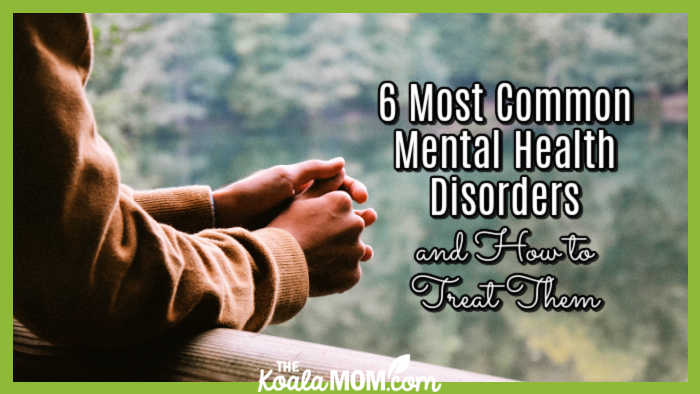In the realm of healthcare, mental health has gained increasing recognition and importance over the years. As we navigate the complexities of our modern world, the prevalence of mental health disorders has continued to rise. These conditions affect millions of individuals worldwide, making it crucial to understand them better and explore the most effective treatment options available.
In this comprehensive blog post, we will delve into the six most common mental health disorders and provide insights into how they can be treated. Whether you or someone you know is grappling with these conditions, gaining knowledge about their nature and treatment can be the first step towards a healthier, happier life.

Anxiety Disorders: Unraveling the Knot of Worry
Anxiety disorders are among the most prevalent mental health conditions globally. These disorders encompass a range of conditions, such as generalized anxiety disorder (GAD), social anxiety disorder, and panic disorder. People with anxiety disorders often experience excessive worry, fear, and a constant sense of impending doom.
Treatment options for anxiety disorders include psychotherapy, medication, or a combination of both. Cognitive-behavioral therapy (CBT) has proven highly effective in helping individuals identify and manage their anxious thoughts and behaviors. Medications like selective serotonin reuptake inhibitors (SSRIs) can also provide relief from anxiety symptoms.
Depression: Understanding the Abyss of Sadness
Depression is another common mental health disorder characterized by persistent feelings of sadness, hopelessness, and a loss of interest in once-enjoyable activities. It affects millions worldwide, often interfering with daily life and overall well-being.
Treatment for depression typically involves psychotherapy, such as cognitive-behavioral therapy or interpersonal therapy, to help individuals identify and challenge negative thought patterns. You can also click here to discover healthcare centers experienced in depression. Medications, including antidepressants, are also commonly prescribed. In severe cases, electroconvulsive therapy (ECT) may be considered.
Bipolar Disorder: Navigating the Highs and Lows
Bipolar disorder is a complex mental health condition characterized by extreme mood swings, ranging from manic highs to depressive lows. The treatment for bipolar disorder often involves mood stabilizers, such as lithium, to control manic episodes. Psychotherapy, like cognitive-behavioral therapy, can help individuals manage their moods and develop coping strategies. Finding the right combination of treatments may take time, but it is crucial for effectively managing this disorder.
Schizophrenia: Unraveling the Mind’s Mysteries
Schizophrenia is a chronic mental disorder that profoundly affects a person’s thinking, emotions, and behavior. It often involves delusions, hallucinations, and disorganized thoughts.
Treatment for schizophrenia is typically multifaceted, combining antipsychotic medications, psychotherapy, and social support. Medications help control the most disruptive symptoms, while therapy can assist individuals in managing daily life and improving social skills. Early intervention and a holistic approach to treatment are crucial for individuals with schizophrenia.
Obsessive-Compulsive Disorder (OCD): Taming the Inner Rituals
Obsessive-Compulsive Disorder is characterized by persistent, intrusive thoughts (obsessions) and repetitive behaviors or mental acts (compulsions) performed to alleviate anxiety. Treatment for OCD often involves a combination of cognitive-behavioral therapy, specifically exposure and response prevention (ERP), and medication, such as selective serotonin reuptake inhibitors (SSRIs). ERP helps individuals confront their fears and reduce compulsive behaviors over time. Medication can complement therapy by reducing the intensity of obsessions and compulsions.
Post-Traumatic Stress Disorder (PTSD): Healing from the Past
Post-Traumatic Stress Disorder (PTSD) is a haunting mental health condition that can profoundly impact an individual’s life, leaving them grappling with the echoes of past trauma. This disorder often emerges after a person has experienced a deeply distressing or life-threatening event, such as combat exposure, sexual assault, natural disasters, abuse, or accidents.
What sets PTSD apart is its ability to encapsulate the individual in a cycle of relentless distress, with symptoms that can range from intrusive, distressing memories and nightmares to heightened anxiety, irritability, and even physical symptoms like headaches or gut health issues.
Healing from the past and managing PTSD involves a multifaceted approach. It requires individuals to confront their traumatic experiences in a safe and controlled environment, often through specialized trauma-focused therapies like cognitive processing therapy (CPT) or eye movement desensitization and reprocessing (EMDR). These therapies aim to help individuals reprocess and make sense of their traumatic memories, reducing their emotional charge.

Mental health disorders can affect anyone, regardless of age, gender, or background. Recognizing the signs and seeking timely treatment is essential for improving the quality of life for those affected. If you suspect that you or someone you love has one of these disorders, please speak to a healthcare professional about it.
The six common mental health disorders discussed in this blog post all have effective treatment options, ranging from psychotherapy to medication and support from healthcare centers specializing in mental health care. By understanding these disorders and the available treatment avenues, we can pave the way for a more compassionate, informed, and supportive society where mental health is prioritized.

No Responses Yet